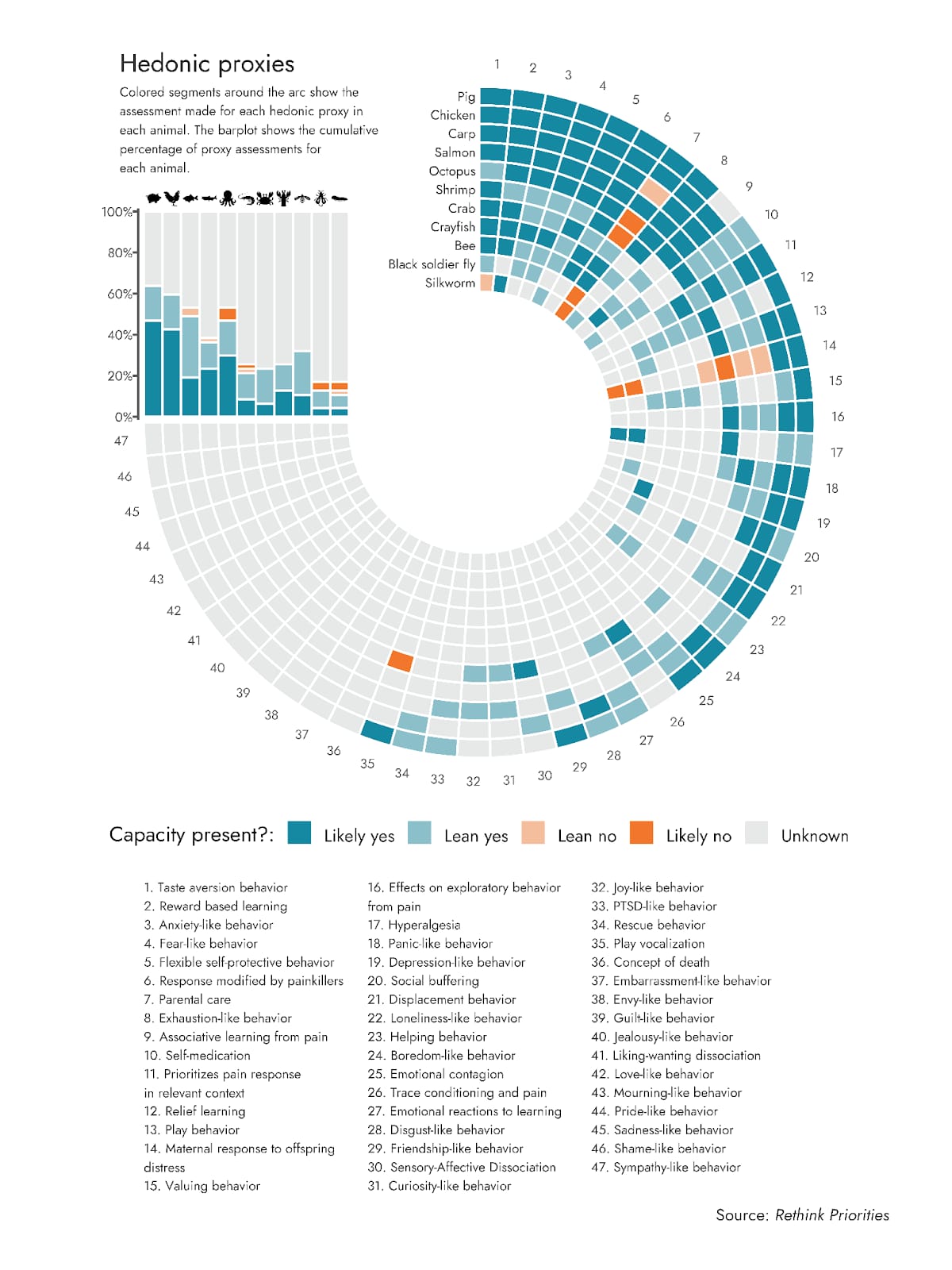
These groups are almost certainly very far outside the moral circles of virtually the entire global population, with some of the latter ones likely not even having any significant level of societal awareness.
Even within the Effective Altruism movement, which has much of its identity intertwined with the idea of moral circle expansion, research on and advocacy for improving the welfare of these potentially vast groups is considered very fringe and unusual.
However, this raises the interesting question, even if people don't care at all about these groups in comparison to mainstream issues, if they are forced to choose which specific one out of this selection they care about the most, which do people intuitively gravitate towards?
@TheAllMemeingEye Today I think I hurt a spider while trying to move it outside, which felt awful. Sometimes I wish Brian was right about experiences/suffering being imaginary/fictional. That would be a much easier world to live in.
@singer yesterday I smacked one dead with my slipper. It doesn't feel pain or emotional suffering and doesn't have a family that will grieve for it. My only concern is to not disturb the ecosystem at my place too much or other bugs might start to appear.
You may find the following pages of interest
Introductions and advocacy pieces
Wild Animal Suffering by Vegan Hacktavists https://wildanimalsuffering.org/
Wild Animal Welfare Problem Profile by 80,000 Hours https://80000hours.org/problem-profiles/wild-animal-welfare/
Why Wild Animals by Animal Charity Evaluators https://animalcharityevaluators.org/donation-advice/why-wild-animals/
The Importance of Wild Animal Suffering by Brian Tomasik and Center for Long-Term Risk https://longtermrisk.org/the-importance-of-wild-animal-suffering/
Research
Wild Animal Initiative https://www.wildanimalinitiative.org/
Animal Ethics https://www.animal-ethics.org/wild-animal-suffering-section/
Essays on Reducing Suffering by Brian Tomasik https://reducing-suffering.org/#wild-animal_suffering
Rethink Priorities https://rethinkpriorities.org/
Misc
Wild Animal Suffering on Wikipedia https://en.m.wikipedia.org/wiki/Wild_animal_suffering
@TheAllMemeingEye thank you.
The spider didn't suffer, I am quick with my slipper. Neither were the insects that spider was going to mercilessly eat spared any suffering.
Tomasik is thoroughly unconvincing and handwavy.
@tbird could you elaborate as to why he is unconvincing? If he's wrong then my worldview changes considerably so if you have a good critique then it's better I know sooner rather than later in life lol
@TheAllMemeingEye bah, that would be a long rebuke, and I wouldn't want to be responsible for changing your worldview.
@TheAllMemeingEye I haven't come across any notable cogent, comprehensive rebuke of EA and this suffering-focused ethics recently. For what it's worth, I think the content from Marian Tupy and others at humanprogress.org provides a good counterpoint. They focus on agency, opportunity and freedom rather than some lofty ideological goal like "our morality and ensuing policies should be based on the reduction of suffering".
So much of EA are non-starters. It is hard to have a meaningful discussion on the merits of particular aspects of it when the premises are so nonsensical.
@tbird thanks, I'll check it out :)
I often find myself frustrated at how many other layman philosophies seem to have non-starter circular-reasoning premises themselves, so if this is both well-argued and layman-accessible then it could potentially open my mind a fair bit
@tbird It's unclear to me why "reduction of suffering" is a "lofty ideological goal" yet that "agency, opportunity and freedom" is not. I would say the opposite: focusing on "agency, opportunity and freedom" is a lofty ideological goal, whereas reducing suffering is humbler.
Your link to humanprogress.org doesn't seem to discuss this subject, at least directly. Can you share a particular article?
@singer agency, opportunity and freedom are not even goals. They are operating principles that can be applied on the individual level and that have been shown to lead to greater development and prosperity (as opposed to philanthropy and altruism, which have not).
Saying that humanity should make it a goal to reduce suffering worldwide and across species is, indeed, lofty and ideological, and there is nothing humble about prescribing "solutions" based on that.
@tbird where did you find out that altruism leads to less prosperity than those operating principles?
@tbird ok, I'll rephrase, where did you learn about what you say in the first paragraph of your previous comment regarding development and prosperity?
@TheAllMemeingEye it's self-evident, but if you would like to see it for yourself you can play around with the datasets here: https://humanprogress.org/datasets/
Strong positive correlation between property rights, human freedom, economic freedom and development and prosperity.
Rich countries didn't get rich through effective altruism or trying to reduce the suffering of spiders and wildlife.
@tbird I'm not trying to be an asshole here, you and the other person are asking me to provide authoritative sources to something akin to arguing that water is wet.
@tbird ok, I misunderstood, I thought by development and prosperity you meant wellbeing rather than raw wealth, though that begs the question of why wealth is preferable as an objective to wellbeing?
@TheAllMemeingEye the correlations also hold for measures of wellbeing. It doesn't mean that's true for every individual, but certainly for any society of more than a few hundred people.
Do you ever wonder why people living on less than $2/month don't seem to care about environmentalism?
@tbird Here's my attempt at reconstructing your line of thought:
There are many distinct goods in life. Some of them like pleasure are fleeting, producing no further value once they've shriveled up. But there are nobler goods. Freedom from oppression isn't merely pleasurable, but a precondition for the agency that allows for happiness to be pursued in the first place.
Just as some would prefer to shoot up and get high, some "philanthropists" burn resources on pleasuring the world in feeble and temporary ways. But this is just another addiction to immediate gratification, worse because it is played out on a grander scale. It looks good in the press, but really it does nothing at all to create a future with goods in it. Actually it deprives the future.
Any talk of "reducing suffering" is no different than this. It's based in the same logic. It exchanges long-term good for short-term relief, or rather, so that the "philanthropist" can take credit quickly and then move on to something else.
How is my reconstruction of your thought process accurate? How is it inaccurate? Are there important points that I didn't touch on?
My main issues with how I've conceived of your way of thinking:
This is focused on humans. Humans are a small minority of sentient life.
Some EA interventions are really, really cheap. Bednets are the stereotypical example.
Is your issue with these types of utilitarian interventions in general, even when benefitting humans, or is it specifically the non-human focus you don't approve of?
@singer but yeah your reconstructed argument sounds like an argument against naïve conventional philanthropy and falls apart when used against EA
@TheAllMemeingEye I don't have a problem with the wealth gap, except in places like Russia where it's mostly a result of rampant and shameless corruption and theft. It's the wrong thing to focus on. And I do resent others telling wealthy people what they should do with their money.
As for @singer 's reconstruction of my line of thought, I find it to be done in bad faith and based on assumptions and assertions I've never made or implied (albeit done respectfully, which I appreciate). I don't think philanthropy is bad, and I am wholeheartedly in favour of good animal welfare, especially when it comes to humane treatment of the ones we eat. Also in favour of bednets for those who need it.
I usually only buy organic and free-range products, and I even avoid stepping on a trail of ants on the sidewalk. The other day there was a moth in my flat and I carefully picked it up by its wings and put it outside the window instead of killing it.
The best of way to summarize my line of thought is that I don't think the focus of EAs, philantropists, environmentalists et al will lead to a net increase in human welfare, and also that I am in favour of sustainable solutions. Redistribution is not a sustainable solution to any of these problems, and has never been shown to be in history.
@tbird remember this discussion started because I disagreed that we should intervene to make wild animals suffer less and that we should base our morality and ethics on the reduction of suffering. That doesn't mean I am in favour of suffering, it means I think it's a bad goal that will not lead to more prosperity.
It is like focusing on "not dying" versus "keeping healthy habits".
@tbird while I still disagree with your conclusions, thank you for making things a lot clearer with the last few summary paragraphs, it's a lot easier now to see what fundamental premise and end goal your previous comments were arguing towards :)
@tbird do you feel more positively towards the EA work on improving economic growth and defending democracy?
https://80000hours.org/problem-profiles/high-leverage-economic-growth/
@TheAllMemeingEye I think positively of economic growth and democracy, yes.
The second article is all over the place, and I don't like the conflation of "defending liberal democracy" with premature overregulation of LLMs, and with the curtailment of free speech and the free flow of information, which is what you invariably find at the other end of the rainbow when you follow the thread.
I'm sorry to keep comparing EA with Environmentalism, but it's history repeating itself. Environmental movements have been massively counterproductive with their focus on degrowth, their shunning of actual sustainable solutions like nuclear energy, and their hysterical and obnoxious approach to activism. Not to mention it has a horrible track record in terms of effectiveness.
I think the EA movement is making very similar mistakes with AI and allocation of income.



